商务礼仪英语翻译
- 格式:docx
- 大小:31.16 KB
- 文档页数:19
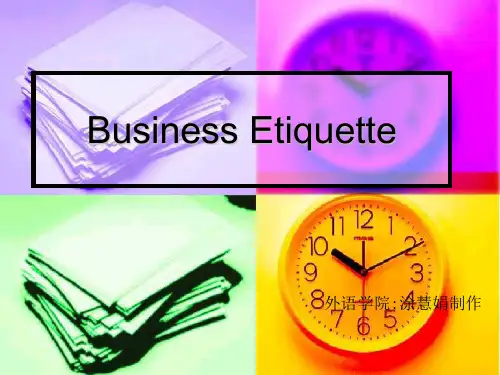
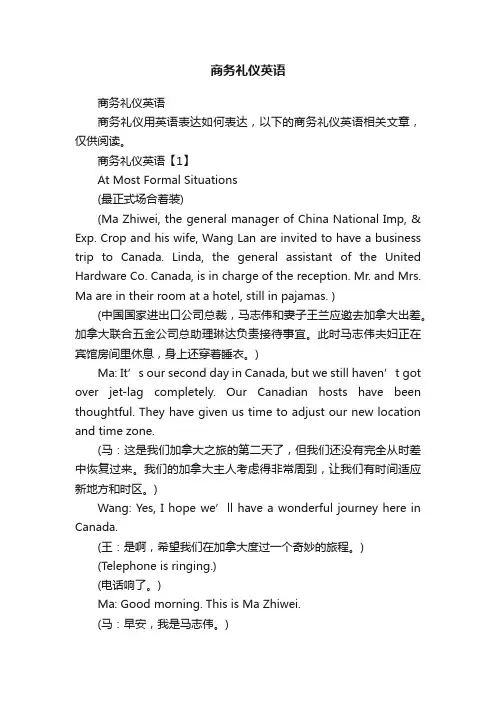
商务礼仪英语商务礼仪英语商务礼仪用英语表达如何表达,以下的商务礼仪英语相关文章,仅供阅读。
商务礼仪英语【1】At Most Formal Situations(最正式场合着装)(Ma Zhiwei, the general manager of China National Imp, & Exp. Crop and his wife, Wang Lan are invited to have a business trip to Canada. Linda, the general assistant of the United Hardware Co. Canada, is in charge of the reception. Mr. and Mrs. Ma are in their room at a hotel, still in pajamas. )(中国国家进出口公司总裁,马志伟和妻子王兰应邀去加拿大出差。
加拿大联合五金公司总助理琳达负责接待事宜。
此时马志伟夫妇正在宾馆房间里休息,身上还穿着睡衣。
)Ma: It’s our second day in Canada, but we still haven’t got over jet-lag completely. Our Canadian hosts have been thoughtful. They have given us time to adjust our new location and time zone.(马:这是我们加拿大之旅的第二天了,但我们还没有完全从时差中恢复过来。
我们的加拿大主人考虑得非常周到,让我们有时间适应新地方和时区。
)Wang: Yes, I hope we’ll have a wonderful journey here in Canada.(王:是啊,希望我们在加拿大度过一个奇妙的旅程。

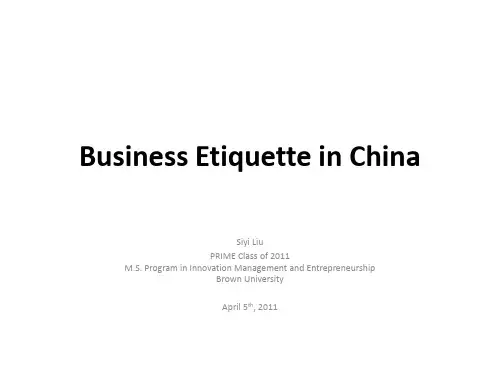
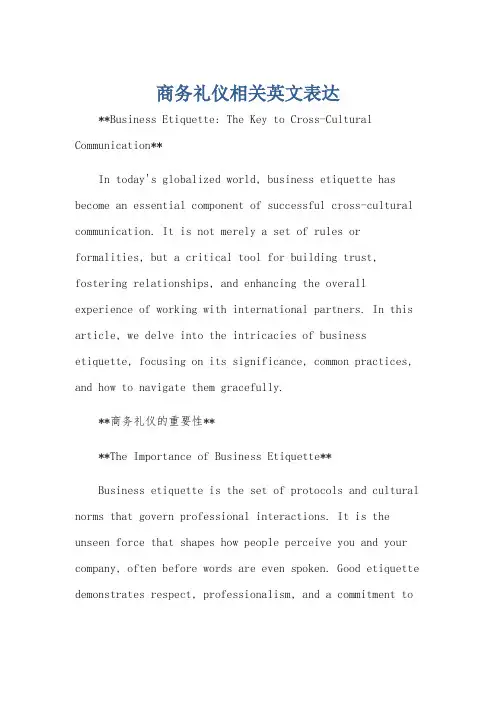
商务礼仪相关英文表达**Business Etiquette: The Key to Cross-Cultural Communication**In today's globalized world, business etiquette has become an essential component of successful cross-cultural communication. It is not merely a set of rules or formalities, but a critical tool for building trust, fostering relationships, and enhancing the overall experience of working with international partners. In this article, we delve into the intricacies of business etiquette, focusing on its significance, common practices, and how to navigate them gracefully.**商务礼仪的重要性****The Importance of Business Etiquette**Business etiquette is the set of protocols and cultural norms that govern professional interactions. It is the unseen force that shapes how people perceive you and your company, often before words are even spoken. Good etiquette demonstrates respect, professionalism, and a commitment tocultural sensitivity, all of which are crucial for successful international business relationships.**常见的商务礼仪实践****Common Practices of Business Etiquette****Greetings and Introductions**Greetings and introductions set the tone for any business encounter. It is essential to familiarize yourself with the cultural norms of the region you are visiting. For instance, in some cultures, a handshake and a direct gaze are considered respectful, while in others, a more subdued greeting with eyes cast down may be preferred.**Communication Style**Communication style can vary widely across cultures. Some cultures prefer a direct, assertive approach, while others favor a more indirect, consensus-building style. Understanding these differences and adapting your communication style accordingly can significantly enhance understanding and trust.**Dress Code**Dress codes vary depending on the industry, region, and occasion. It is crucial to research and adhere to the dress code appropriate for the business environment you are entering. In some cultures, a business suit is expected, while in others, a more casual dress code may be acceptable. **Gift-Giving**Gift-giving is a common practice in many cultures, but the rules and expectations surrounding it can vary widely.It is essential to understand the appropriate gift-giving customs of the culture you are dealing with, as well as to avoid giving gifts that may be considered inappropriate or offensive.**餐桌礼仪****Dining Etiquette**Dining etiquette is a crucial aspect of business communication, especially in cultures where meals are often used as a platform for business discussions. Understanding the rules of table manners, such as the order of dishes, proper use of utensils, and when to speak and when tolisten, is essential for ensuring a smooth and enjoyable dining experience.**如何优雅地遵循商务礼仪****How to Navigate Business Etiquette Gracefully**1. **Research and Prepare**Before engaging in any business activity, take the time to research the cultural norms and business etiquette of the region you will be visiting. This will help you anticipate and prepare for any potential cultural differences.2. **Be Respectful and Adaptive**Always maintain a respectful and adaptive attitude. Be willing to adjust your behavior to fit the local norms and expectations, and be open to learning from new cultures.3. **Observe and Learn**Pay attention to the behaviors and interactions of others. Observe how they greet each other, communicate, and interact during meals. Use these observations as a guidefor your own behavior.4. **Make Mistakes, but Learn from Them**It is inevitable to make mistakes when navigating new cultural norms. When you do make a mistake, don't be afraid to apologize and learn from it. Use these experiences to improve your understanding and proficiency in business etiquette.In conclusion, business etiquette is a crucial component of successful cross-cultural communication. By understanding and adapting to the local norms and expectations, you can build trust, foster relationships, and enhance the overall experience of working with international partners. Remember, business etiquette is not just about following rules; it is about respect, understanding, and connecting with people from different cultures.。
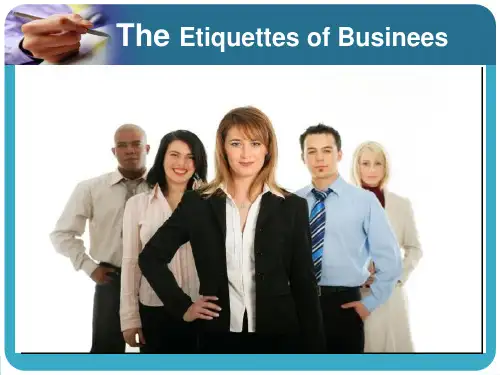

商务礼仪的英语
商务礼仪的英语是"business etiquette"。
商务礼仪是指在商业环境中,人们相互交往和沟通时应遵循的规范和规则。
它包括了各种方面,如会议礼仪、商务谈判礼仪、商务餐桌礼仪等。
在商业会议中,人们应该准时到达并尊重会议的议程。
在会议中,应该注意尊重他人的发言权,不打断别人的发言,同时也要遵循会议主持人的指导。
在商务谈判中,人们应该保持礼貌和尊重,表达自己的意见时要注意语气和措辞,避免冲突和争吵。
商务餐桌礼仪是在商务餐宴上的行为规范,包括了用餐姿势、餐具使用、餐桌交流等方面。
商务礼仪还包括了正式的商务信函和电子邮件的撰写礼仪。
在撰写商务信函时,应该使用正式的语言和格式,注意用词得体、语法准确。
在撰写电子邮件时,要注意用简洁明了的语言,避免使用缩写和俚语,同时要注意邮件的格式和附件的发送。
商务礼仪在国际商务中也很重要,因为不同国家和地区有不同的商务文化和礼仪习惯。
了解和尊重对方的文化背景和习俗,能够增加商务合作的成功率。
比如,在一些亚洲国家,人们在商务交流中更加注重面子和尊重,而在西方国家,注重效率和直接沟通。
商务礼仪是商业环境中必须遵循的行为规范和习惯,它能够促进商务交流的顺利进行,建立良好的商业关系。
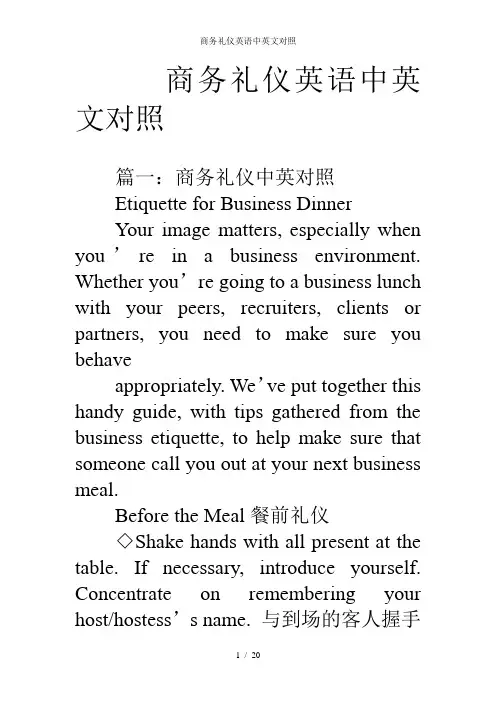
商务礼仪英语中英文对照篇一:商务礼仪中英对照Etiquette for Business DinnerYour image matters, especially when you’re in a business environment. Whether you’re going to a business lunch with your peers, recruiters, clients or partners, you need to make sure you behaveappropriately. We’ve put together this handy guide, with tips gathered from the business etiquette, to help make sure that someone call you out at your next business meal.Before the Meal餐前礼仪◇Shake hands with all present at the table. If necessary, introduce yourself. Concentrate on remembering your host/hostess’s name. 与到场的客人握手致意,如果需要,介绍一下自己。
努力记住男女主人的姓名。
◇Remain standing until host sits.在主人落座之前保持站立。
◇Place your napkin on your lap after everyone is seated and after your host has moved his/her napkin.在所有人落座之后,主人展开餐巾,这时你也可以将餐巾展开平铺在膝盖以上部位。
◇Don’t ask the waiter to explain everything on the menu; you will annoy others and appear indecisive.不要让侍者为你一一讲解菜单上的菜品,这样会招人讨厌而且显得你缺乏主见。
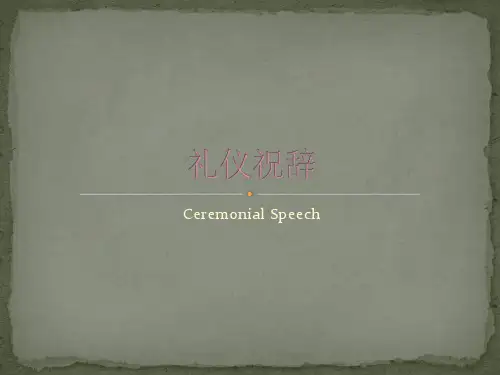
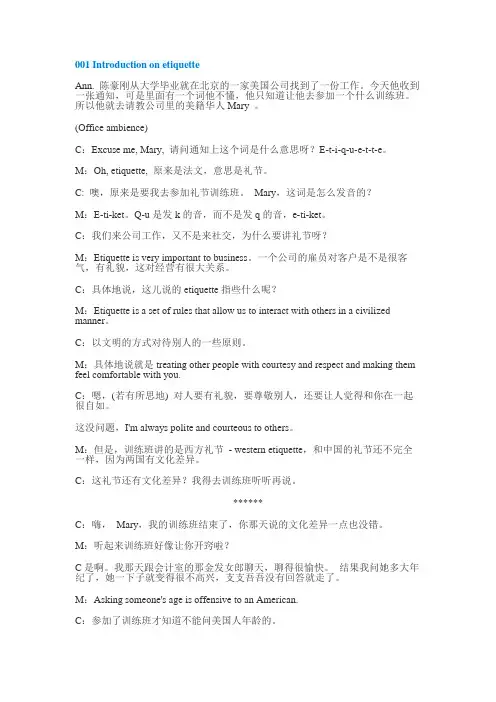
001 Introduction on etiquetteAnn. 陈豪刚从大学毕业就在北京的一家美国公司找到了一份工作。
今天他收到一张通知,可是里面有一个词他不懂,他只知道让他去参加一个什么训练班。
所以他就去请教公司里的美籍华人Mary 。
(Office ambience)C:Excuse me, Mary, 请问通知上这个词是什么意思呀?E-t-i-q-u-e-t-t-e。
M:Oh, etiquette, 原来是法文,意思是礼节。
C: 噢,原来是要我去参加礼节训练班。
Mary,这词是怎么发音的?M:E-ti-ket。
Q-u是发k的音,而不是发q的音,e-ti-ket。
C:我们来公司工作,又不是来社交,为什么要讲礼节呀?M:Etiquette is very important to business。
一个公司的雇员对客户是不是很客气,有礼貌,这对经营有很大关系。
C:具体地说,这儿说的etiquette指些什么呢?M:Etiquette is a set of rules that allow us to interact with others in a civilized manner。
C:以文明的方式对待别人的一些原则。
M:具体地说就是treating other people with courtesy and respect and making them feel comfortable with you.C:嗯,(若有所思地) 对人要有礼貌,要尊敬别人,还要让人觉得和你在一起很自如。
这没问题,I'm always polite and courteous to others。
M:但是,训练班讲的是西方礼节- western etiquette,和中国的礼节还不完全一样,因为两国有文化差异。
C:这礼节还有文化差异?我得去训练班听听再说。
******C:嗨,Mary,我的训练班结束了,你那天说的文化差异一点也没错。
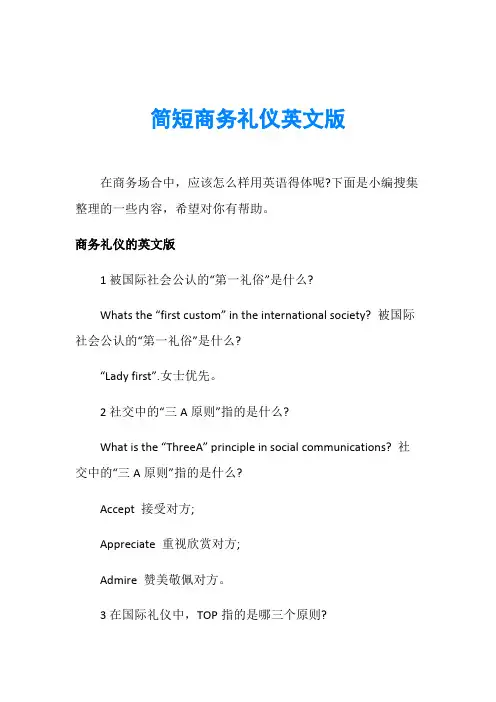
简短商务礼仪英文版在商务场合中,应该怎么样用英语得体呢?下面是小编搜集整理的一些内容,希望对你有帮助。
商务礼仪的英文版1被国际社会公认的“第一礼俗”是什么?Whats the “first custom” in the international society? 被国际社会公认的“第一礼俗”是什么?“Lady first”.女士优先。
2社交中的“三A原则”指的是什么?What is the “ThreeA” principle in social communications? 社交中的“三A原则”指的是什么?Accept 接受对方;Appreciate 重视欣赏对方;Admire 赞美敬佩对方。
3在国际礼仪中,TOP指的是哪三个原则?What does TOP mean in the international etiquette? 在国际礼仪中,TOP指的是哪三个原则?Time时间;Objective目的;Place 地点。
4和西方人交谈时,应避免哪八个话题?When you are talking with people from western countries, eight topics should beavoided. What are they? 和西方人交谈时,应避免哪八个话题?Age, marital status, salary, experience, address, personal life,religious belief, politics, and opinions about other people.年龄,婚否,收入,经历,住址,个人生活,宗教信仰,政治见解,以及对他人的看法。
5哪三个词在社交场合最常用?Which three words are the most common ones in social life? 哪三个词在社交场合最常用?Thanks谢谢;Excuse me (sorry) 对不起;Please 请。
国际商务礼仪英文教程翻译篇一:国际商务礼仪作业(英文版)BusinessGift-givingaroundtheworld武汉大学何坚婷abstract:nowadays,giftsareplayingasanimportantroleininternationalbusine ssrelations.Butdifferentcountrieshavedifferentcustomsofgift-giving.Thepa pergivessomedetailsabouthowtomakeagoodbusinessgift-givinginmanycou ntriesaroundtheworld.Keywords:significance,differentcultures,comparativeofbusinessgift-givin gintroduction1.SignificanceofGift-givinginBusinessFirstofall,ininternationalbusinessdealings,appropriategift-givingcannotonl yfullyshowtheenterprisescultureandacademicspirits,butalsopromoteeachot her'sfriendship.andthen,gift-givingcanshowpeople'scongratulations,condolencesand thankstoothers.atthesametime,itisalsoanemotionalinvestment,reducingthe emotionaldistancebetweenpeopleandbeingconductivetopeople'scom munication.2.differentcultures'ViewonGiftsBeforewestarttotalkabouthowtomakeagoodbusinessgift-giving,let'sg iveaviewupondifferentcountiesintheworld,knowingthathowthepeopleindif ferentculturestreatthegifts.Thefirstoneisamerica!inamerica,peoplelikethepracticalandpeculiargiftsverymuch.Forexample,if youcouldgivethemsomesmallgiftswithuniquestylesorethniccharacteristics, suchasthefakedterracottawarriorsandhorses,theywillbeveryhappy.america npeopletreatthesnailsandhorseshoeasthemascot.whenyoupresentsomegifts tothem,remembernottomakethenumberofgiftssingular,andyoushouldbeatte ntiontothepackaging.inaddition,packaginggifts,donotuseblackpaper,becau setheblackinamericaneyeswasunluckycolor.also,giftsshouldpayattentionto thebusinessendoftheconversation.intheUK,peopledon'tlikethegiftsthatareveryexpensive.itwillbetakena sabribeifyougivethemsomepreciousgifts.Giftslikepremiumchocolate,atwo bottlesofwine,andflowerswouldbeagoodchoice.dorememberthatnottoprese ntgiftsprintedwithcompanyflag.also,remembernottosendthelily,becauseit meansdeath.inFrance,peopleareveryromantic,sotheyusuallyliketheartistic andintellectualgiftsverymuch,suchaspicturesque,artalbums,andsmallcrafts .ifyouareinvitedtoaFrenchpeople'shouseforadinner,remembertotakea fewpiecesoffreshflowerswithoutbundlingwithyou,butthechrysanthemums mustbeexcluded,becausechrysanthemumsareonlyusedatfuneralsinFrance.i nRussia,peopleliketotreattheguestswithbreadandsalttoshowtheirfriendshipandrespect.Theyliketoreceivegiftsthatarebrandname,suchasaLEViSjeans,r egardlessofthelevelofthevalueofgifts.Butdonotgivemoneytopeople,becaus eitwillbeconsideredascharityandinsults.inJapan,peoplethinkthatgiftsrepresentpeoples'truemind.FortheJapan ese,theceremonyofgiftgivingismoreimportantthantheobjectsexchanged.wh ileyougivethemsomeflowers,theflowersshouldnotbewhite,astheseareassoc iatedwithdeath.also,avoidgivinggiftswithevennumbersofcomponents,such asanevennumberofflowersinabouquet.Fourisanespeciallyinauspiciousnum ber,nevergivefourofanything.inSaudiarabia,peopleareveryhospital,butyouarenotexpectedtobringanygift wheninvitedintoaSaudihome.arabtradersgenerallypresenteexpensivegiftst oothers,butalsowouldliketoreceivethesamevaluableinreturn.donotpresentu seditemstothem,notsoaswineandgiftswithanimalpatternsonit.itis consideredaviolationoftheirprivacytogivethewifesofarabsgifts.3.HowtomakeaGoodGift-giving aswehavediscussedaboutthedifferentcultures'attitudestowardgift-giv ing,i'mgoingtolistthewaytomakeagoodgift-givingindifferentcountrie saroundtheworld.First,weshouldknowaboutthefourelementsofgift-giving,thusgifts,means,ti meandplace.Totellitindetail,let'shavealookonsomecountriesthatmayprovideusso meusefulinformation.inamerica,businessgiftsarediscouragedbythelaw,whichallowsonlya$25tax deductionongifts.So,itisimportantforyoutochooseagoodtimetopresentgifts, thetimewhenyouarriveorwhenyouleaveamericaisoK.whenyouvisitahome,i tisnotnecessarytotakeagift,however,itisalwaysappreciated.Youmaytakeflo wers,aplant,orabottleofwine.Takecare,ifyouwishtogiveflowers,havethems entaheadsoasnottoburdenyourhostesswithtakingcareofthemwhenyouarrive .andpersonalgiftssuchasperfumeorclothingareinappropriateforwomen. intheUK,giftsarenotpartofdoingbusiness.Ratherthangivinggifts,itisprefera bletoinviteyourhostsoutforamealorashow. ButwhenyouareinvitedtoaEnglishhome,youmaybringflowers,liquororcha mpagne,andchocolates.Sendabrief,handwrittenthank-younotepromptlyafte rwards,preferablybymessengerratherthanbymail.inFrance,itisnotagoodideatogiveabusinessgiftatyourfirstencounter.Forthan k-you's,sendatleastanote,thedayafteryouwereinvitedtoadinner.ofcaus e,youcansendflowersorabasketoffruitifyoulike.Toberomanticisnecessary. inRussia,giftsaremorepopularthanthecountriesdescribedbefore.So,youwill havemorechoicetopresentgiftstoyourfriendsinRussia.Giftslikebaseballcaps ,rockorcountryandwesterncassettesarewelcome,also,camera,watches,andi nexpensivejewelryisoK.Thusafteryouchooseagoodtime,youwillmakeagoo dimpressiononyourfriendswiththewonderfulgifts.inJapan,giftgivingisvery common.Businessgiftsabsolutelymustbegivenatmidyearandatyearend.The ually,Japanesedonotopengiftsdirectlyoncereceivingthem.iftheydo,theywillberestrainedintheirappreciation. Thisdoesnotmeanthattheydonotlikewhatyouhavegiven.whenchoosinggifts, importedgoodsandelectronicproductarefine.inSaudiarabia,everySaudiwhomustbrokerorapprovea篇二:国际商务礼仪论文Howtomakefirstimpressionassignment2across-culturalStudyofHowtomakeagoodfirstimpressionname:Studentsno:major:mobilephone:Helloeveryone!i’m——.Today,ourtopicisHowtomakeagoodfirstimpression.Thefirstimpress ionisthefirstimpressiontwostrangersmeetformation,isapreliminaryevaluati onbyobservationontheothersideofthedress,speech,mannersandsoontoeach other.Thefirstimpressionofthewholeimpressionformationplayadecisiverole ,itisof tenafterintercourseaccordingto.So,whethertoleaveothersagood”firsti mpression.”oftendeterminesthesuccessorfailureofcommunicationwithothe rs.So,intoday'slecture,wewillfocusonhowtomakeagoodfirstimpressi onprofound?Person'sappearancedon’tdecide,butdependsentirelyontheirowncharacterexpressionwasmostincisive.Vulgaractionisalwaysboring.Forexa mpleinFrance:socialoccasionstomeetwiththeguests,generallytoshakehands forceremony.Yungwomenareoftensubjectedtocurtsy,Frenchcertainsocialcl ass”akissonthehand”isalsoquit epopular,butShikissinghand,mouthshouldn otcomeintocontactwithherbythehand,norkissglovedhand,notkissinginpubli cplaces;donotkissthegirl'shand.dellcarnegiein”sixsuggestionshowtowinfriendsandinfluencepeople”abook istomakeagoodfirstimpression:?Tobeapatientlistener,toencourageotherstotalkabouthisown.?Smile.?mentionthenameofothers.?Talkwithothersinterestedinthetopic.?Feelheisveryimportanttoletotherssincereway.?Begenuinelyinterestedinotherpeople.beforetalkingtoafterthinking,clearex pression,rhythm,nottoofast,intonationshouldspeakinmeasuredtones,andthe aestheticfeelingofmusic.Lookpleasedwithoneselfmakegestures,suchasunsi ghtlyadjoinsactionshouldbeavoided.aseveryoneknows,Britainisacountry,p olite,payattentiontocultivation.meetingofelders,superiorsandnotfamiliarwi thtitle,title,andinothernamesprecededbythattitle,lady,lady,mr.ormiss.Betw eenfriendsandacquaintancescommonlyknown.Theymetforthefirsttimepeo pleshakehands,smileandsay:”hello!”arrogant,sayyesandmeanno,ortoavoidbeingseen,fulloftwistsandturns,ortoa skquestions,gossipyandmeddlesomewilldamagetheimageandtheatmosphereofcommunication.Learntolisten.americansgenerallycheerful,sociable,nottostickattrifles.Thefirstmeetingisnotnecessa rilyshakehands,sometimesjustsmile,orawaveof”(Hi,acquaintanceswillsay Hey!Up!what's?”.)choosingthepartner,willoftenbegintopayattentiont othosewholookedbeautiful,butifwewanttokeepthegoodinterpersonalrelatio nshipandcommunicationobject,wecanonlychoosethosehasimportantsignifi canceinourviewofvalue.TheBrazilianenthusiasm,bold,frank,honest.incont actwithBrazilian,youwillnotfeelcold,feelrejected,youcantalkwiththeBrazil ianrelaxed,takeone'sease,evenwillsoonbecomebosomfriends,andyou canfeeltheBrazilianwithachildlikeplayfulstrengthandloosehabits. Butoftentheshy,afraidofpeople,alotofpeoplearejustpassivecommunication. Psychologistshavefoundthatpeoplecannottaketheinitiativetocontact,therea rethreemainreasons:1.2.3.Sincefoundoutthereason,wehaveanantidoteagainstthedisease.Youcanexerc isetheirownfromthefollowingthreeaspects:1.someeasyquestionsorcommentsonyourside,easyhappening;attracttheatte ntionoftheotherparty.2.Self-introductionisakeysocial.activeright,haveastyleofone'sownsel fintroduction,oftengiveagoodimpressionontheleft.Forexample,thefamousoperawriterweiminglingisnothigh,”saidaman”.Buth eavoidedtonever,butofte ninpublictoridiculethewaytointroduceyourself:”iBinapolunshorter,withLu XuncaoYu;repeatedmeasurement,noefforttoplayagun,conditionaltouchpen ,andthentookupthetext.”3.thebasicpsychologicalneeds.inordertoattracttheattentionoftheotherparty,ac tivepraiseisveryuseful.4.people.References:1.《carnegiescompleteBooksofSuccess》--carnegie(USa)篇三:国际商务礼仪论文浅议中西商务礼仪存在差异的原因商务礼仪是人们在商务活动中长期形成的一种惯用形式和行为准则。
关于商务英语礼仪的单词商务英语礼仪是在商务交际中必不可少的一部分。
掌握相关的单词和短语可以帮助我们在商务场合中更加自信和得体地表达自己。
以下是一些与商务英语礼仪相关的单词和短语:1. Greetings - 问候- Hello / Hi - 你好 / 嗨- Good morning / afternoon / evening - 早上好 / 下午好/ 晚上好- Nice to meet you - 很高兴见到你2. Introductions - 介绍- May I introduce myself? - 我可以自我介绍吗?- This is Mr./Ms. [Name], he/she is from[Company/Department] - 这位是[姓名]先生/女士,他/她来自[公司/部门]- Have you met [Name]? - 你见过[姓名]吗?3. Small talk - 闲聊- How are you? - 你好吗?- How's business? - 生意如何?- Did you have a good journey? - 旅途愉快吗?4. Courtesy phrases - 礼貌用语- Please - 请- Thank you - 谢谢- You're welcome - 不客气- Excuse me - 对不起5. Polite requests - 礼貌的请求- Could you please...? - 你能...吗?- Would you mind...? - 你介意...吗?- I would appreciate it if you could... - 如果你能...我会很感激6. Business meetings - 商务会议- Agenda - 议程- Minutes - 会议纪要- Action items - 行动事项- Chairperson - 主席7. Negotiations - 谈判- Terms and conditions - 条款和条件- Proposal - 提议- Counteroffer - 还盘- Agreement - 协议8. Presentations - 演示- PowerPoint - 幻灯片- Visual aids - 视觉辅助工具- Q&A session - 问答环节- Handouts - 分发资料9. Business correspondence - 商务函件- Dear Sir/Madam - 尊敬的先生/女士- Sincerely - 真诚地- Attached - 附上- Please find enclosed - 附上10. Networking - 社交网络- Business card - 名片- Networking event - 社交活动- Professional connections - 职业联系- Follow-up - 后续跟进这些单词和短语可以帮助我们在商务英语交际中更加得体地与他人沟通和表达自己的意思。
Lesson 001 - Introduction on etiquette礼节美语001讲Ann. 陈豪刚从大学毕业就在北京的一家美国公司找到了一份工作。
今天他收到一张通知,可是里面有一个词他不懂,他只知道让他去参加一个什么训练班。
所以他就去请教公司里的美籍华人Mary 。
(Office ambience)C:Excuse me, Mary, 请问通知上这个词是什么意思呀?E-t-i-q-u-e-t-t-e。
M:Oh, etiquette, 原来是法文,意思是礼节。
C: 噢,原来是要我去参加礼节训练班。
Mary,这词是怎么发音的?M:E-ti-ket。
Q-u是发k的音,而不是发q的音,e-ti-ket。
C:我们来公司工作,又不是来社交,为什么要讲礼节呀?M:Etiquette is very important to business。
一个公司的雇员对客户是不是很客气,有礼貌,这对经营有很大关系。
C:具体地说,这儿说的etiquette指些什么呢?M:Etiquette is a set of rules that allow us to interact with others in a civilized manner。
C:以文明的方式对待别人的一些原则。
M:具体地说就是treating other people with courtesy and respect and making them feel comfortable with you.C:嗯,(若有所思地) 对人要有礼貌,要尊敬别人,还要让人觉得和你在一起很自如。
这没问题,I'm always polite and courteous to others。
M:但是,训练班讲的是西方礼节- western etiquette,和中国的礼节还不完全一样,因为两国有文化差异。
C:这礼节还有文化差异?我得去训练班听听再说。
******C:嗨,Mary,我的训练班结束了,你那天说的文化差异一点也没错。
简短商务礼仪中英文版无论在国际商务宴会,还是商务合作会议中我们都不可避免地会与他人用英文交流。
下面是店铺搜集整理的一些简短商务礼仪中英文版,希望对你有帮助。
常用简短商务礼仪中英文版【情景再现】一位美国客户来到Catherine的办公室洽谈业务,该客户非常友好,业务谈得很成功。
事毕,美国客户谢绝了Catherine的午饭邀请,起身要走,Catherine站起身来,欲送他出办公室,客户摇摇手说:I will see myself out, please.【小编的小喇叭】I will see myself out, please.请留步,不用送了。
see这个词我们都很熟悉,我们还学过它的一个习语see sb. off,意为“送别某人”;今天我们学的这个see sb. out意思是“送某人出门”。
这些习语的意思都是固定的,不能根据字面意思而误解为“看着某人出门”。
因此平时需要多积累,并付诸应用,这样才能将知识消化,为我所用。
【英语情景剧】Jane: It's very late. I have to go home now.简:现在很晚了,我得回家了。
Shirley: OK, let me see you out.雪莉:好吧,那我送你出去。
Jane: Well, I'll see myself out, thank you.简:哦,谢谢,请留步。
【情景再现】Tom最近他经常陪一名美国同事参加商务会议,可他还和平常一样,随便穿一件休闲衣就赶去参加会议,完全没有一个职业经理人的样子。
一天,参加完会议,美国同事提议他去商场买套西装,而Tom 不以为然,这位同事就说:You know that chothes make the man.【小编的小喇叭】Clothes make the man. 人靠衣装。
我们经常说“人靠衣装,马靠鞍”,这句话的对应英文就是Clothes make the man.值得注意的是这里的make的用法,它在此意为“有利于……的发展,创造出,产生”,例如:Practice makes a winning team.勤加训练必有助于球队获得胜利。
商务礼仪英语翻译商务礼仪英语翻译【篇一:中西商务礼仪文化的差异及翻译】中西商务礼仪文化差异与翻译礼仪是一个民族在特定的历史条件和地理环境中发展和承袭下来的礼节文明规范,是一种文化形态的象征和体现。
下面本文将从文化层面上,着重从价值观、时间观、饮食观、语言习惯等方面对中西商务礼仪的差异进行比较。
一、价值观差异在中国的文化观念中,人生的价值往往体现在其社会价值之中,总是把个人或者自我放在社会关系中去考察,否定个体的自我主体性,人生意义常常与“忘我”或者“牺牲”相联系。
它追求的是这一种群体和谐的、稳定的伦理道德社会;西方则不然,其主张以自我为核心的个人主义价值观念。
这种价值观的差异可以说是根本性的,它是决定中西方商务礼仪差异的根本因素。
一方面,中国人有着强烈的宗族观念,把自己的家叫“寒舍”,自己的作品叫“拙作”,称对方为“您”,对方的意见为“高见”、“宝贵意见”。
而英语中的敬语和谦词则非常少见,在英语环境里,不管谈话的对方年龄多大、辈份多长、地位多高,you就是you,i就是i,用不着像汉语那样用许多诸如“您、您老、鄙人”等敬谦语。
所以,在国际商务活动中,中国人的谦虚与贬己常常让西方人感到不礼貌。
另一方面,美国文化重视青年。
而老年人则成为相对不受重视的群体。
与之相比,中国传统文化中则强调尊重长者。
汉语习语中就有很多体现了这一价值观念。
如”宝刀未老”、”老当益壮;”姜还是老的辣”等等。
在汉语的称呼中,对待年长者常加称一个‘老’字以示尊敬。
如”老领导”,”老先生”,“老同志”等。
甚至在姓氏后面加一”老字以示对德高望重的人商务活动中,要实现更加有效的交际,就必须了解跨国商务礼饮食观、语言习惯及非语言习惯等方面对中西商务礼仪的差异的尊称。
如“刘老、“张老“等。
而在西方和年老者谈话时应尽量避免提及年老的事实即使涉及有关内容也总以委婉的形式出现。
如用senior代替old man,用elderly advanced in age代替old。
另外,在西方人眼里视为“隐私“的事情,在中国人眼里却是关心他人的具体体现。
如见面后寒暄询问别人的年龄、籍贯职业收人婚姻状况、家庭情况、体重等都属于很正常的事情。
而在西方,这些都属于隐私,询问这些问题均被视为没有失礼貌的。
在中国老朋友可以不用敲门就”登堂入室“,这对西方人来说是不可思议的事。
即使是一件小事要问,他们也需要先打个电话,问主人是否方便。
二、时间观差异在中国的传统文化领域中,人们推崇一种环形的时间观念。
因此,中国人利用时间比较随意,比较灵活;西方人奉行的则是线形的时间观念,认为时间是一去不复返的。
这种差异主要导致例如以下两个方面的中西差别:首先,在国际商务活动中,中国人不重视预约,有时候即使预约,也不严格遵守预约时间,而西方人则注重预约,且严格按照预约时间安排活动。
其次,在商务谈判中,西方人喜欢开门见山,且在谈判中不喜欢停下或者保持沉默,而是习惯于速战速决。
然而,中国人则喜好感情投资,喜欢宴请或者送礼物,在交杯换盏中达成一致,商务活动进程一般比较缓慢。
三、饮食观差异用餐礼仪。
在中国人在吃饭的时候都喜欢热闹,很多人围在一起吃吃喝喝,说说笑笑,大家在一起营造一种热闹温暖的用餐氛围。
除非是在很正式的宴会上,中国人在餐桌上并没有什么很特别的礼仪。
而西方人在用餐时,都喜欢幽雅、安静的环境,他们认为在餐桌上的时候一定要注意自己的礼仪,不可以失去礼节,比如在进餐时不能发出很难听的声音。
中西方宴请礼仪也各具特色。
在中国,从古至今大多都以左为尊,在宴请客人时,要将地位很尊贵的客人安排在左边的上座,然后依次安排。
在西方则是以右为尊,男女间隔而坐,夫妇也分开而坐,女宾客的席位比男宾客的席位稍高,男士要替位于自己右边的女宾客拉开椅子,以示对女士的尊重。
另外,西方人用餐时要坐正,认为弯腰,低头,用嘴凑上去吃很不礼貌,但是这恰恰是中国人通常吃饭的方式。
吃西餐的时候,主人不提倡大肆的饮酒,中国的餐桌上酒是必备之物,以酒助兴,有时为了表示对对方的尊重,喝酒的时候都是一杯一杯的喝。
四、语言习惯差异中国人大多使用一些比较随和的口头语,很轻易的就体现了人与人之间的一种亲切感。
比如,“你去哪儿了?”可对西方人来说,这种打招呼的方式会令对方感到突然、尴尬,甚至不快,因为西方人会把这种问话理解成为一种“盘问”,感到对方在询问他们的私生活。
在西方,日常打招呼他们只说一声“hello”或按时间来分,说声“早上好!”“下午好!”“晚上好!”就可以了。
更多的时候西方人用谈论天气情况来展开话题交谈。
中西语言中有多种不同的告别语。
如在和病人告别时,中国人常说“多喝点开水”、“多穿点衣服”、“早点休息”之类的话,表示对病人的关怀。
但西方人绝不会说“多喝水”之类的话,因为这样说会被认为有指手画脚之嫌。
比如他们会说“多保重”或“希望你早日康复”等等。
在中国,谦虚被奉行为一种美德。
所以,在得到别人的赞扬时,中国人常以“哪里”、“不好”、“不行”、“还不够”等来回应。
这不符合西方传统,尤其是美国。
西方人会对别人夸奖做积极的回应,常说“thank you”。
五行为语言差异行为语言差异包括手势语、身势语、目光语、体距等。
在国际商务活动中,举手投足之间往往都能反映出不同的文化特性。
比如,商务礼仪中最常见的非语言习惯首推握手。
在西方国家,两人握手后马上松开,两人的距离也随即拉开;而中国人为了表示热情和尊重对方,常常握住对方的手久久不放,还十分满足的闲谈消磨时光,有时还往往拍打对方的肩和背,对此西方国家的人会觉得就窘迫不堪,他们认为体距太近会显得过于亲密。
中国人见面喜欢点点头,握握手或行拱手礼,但在西方,特别的欧美国家,拥抱礼是十分常见的见面礼与道别礼,亲吻礼和吻手礼也是常见的西方见面礼。
西方男士在正式社交场合通常穿保守式样的西装,内穿白衬衫,打领带。
他们喜欢黑色,因此一般穿黑色的皮鞋。
西方女士在正式场合要穿礼服套装。
另外女士外出有戴耳环的习俗。
西方国家,尤其是在美国,平时人们喜欢穿着休闲装,如t恤加牛仔服。
而中国的一些传统服饰,已渐退历史舞台,除了一些特殊的场合或是时装发布会等,中国人的穿着打扮已日趋西化。
总之,从上述几个方面的对比可以看出,中西方的文化差异导致了截然不同的商务礼仪。
当今世界经济全球化程度日益加深,商务人士要想成功地进行国际商务交往,就必须文化层面理解和认识国际商务礼仪,及时调整自己的礼仪行为,避免产生不必要的误会,最终存进国际商务活动的顺利开展!【篇二:第三章英语交流中商务礼仪】第三章商业礼仪一、初次会见客户meeting with a potential client学习完本单元之后,你将对以下礼节有深入的了解:如何自我介绍、乘车礼节、与初遇之客户聊天的话题、如何邀约客户。
--------------------------------------------------------------------------------英文正文--------------------------------------------------------------------------------b: excuse me. are you ms. joan butler?j: yes, i am. from northern vancouver of canada. and are you mr. sun?b: no, maam, im not. im david taylor, sales manager at alex trading. hi. mr. sun asked me to come and meet you, because he was unexpectedly tied up this morning. hes very eager to meet you, and he sends his warmest regards.j: i see. well, its very nice to meet you, david. and please, feel free to call me joan. im not big on formalities.b: it would be my pleasure. may i help you with your bags? we have a car waiting outside. i hope you had a pleasant flight over, joan.j: this one was uneventful, except for a little turbulence here and there. in fact, i feel as crisp as a new dollar bill.b: glad to hear it. would you like an informal dinner with us tonight? mr. sun asked me to inquire.j: its very nice of him, but truthfully id rather just spend a quiet evening in the hotel. mr. sun wont mind?b: not at all. he expected youd want a little r and r first. just to confirm, you know that tomorrows meeting is scheduled for 10 a.m. at our offices? ill pick you up at the hotel at 9:15.j: thatll be fine. david, thank you so much.b: its my pleasure. by the way, are there any sights youd like to see while youre here?j: well, i have instructions not to mix business with pleasure on this trip. but could we see the world trade center, and the economic development zone?b: thats no problem. ill set up appointments for later this week.j: thank you very much.--------------------------------------------------------------------------------中文翻译--------------------------------------------------------------------------------b: 您好,您是joan butler女士吗?j: 我是来自加拿大北温哥华。